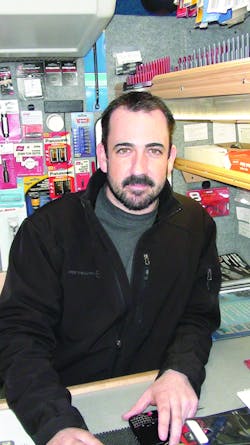After being laid off at 23, Bob Covert decided it was the right time in his life to gamble on going into business for himself. Three years later, after working a territory in the Boston area with a major tool company, Bob took another gamble and moved to the small town of Bow, N.H. to become an independent distributor. Starting from scratch in a new rural territory without the backing of a major name might seem like the hardest way to succeed in this business, but Bob has some very good resources.
His uncle, Clark Heintz, had been a mobile dealer in the area for 34 years when he stepped away from a franchise to open his own independent tool business. He offered his nephew a partnership, and it proved to be a good match. In less than one year Clark had opened a new storefront location and turned the truck over to Bob.
Although the store and the truck are two separate businesses, Clark Heintz Tools and Equipment is one of Bob’s most valuable resources. Bob stocks most of the well-known brands like Ingersoll Rand and OTC, but Clark helps him find other top-quality tools from a wide variety of vendors. And if a customer asks about a tool that Bob has never heard of, Clark’s connections, knowledge and years of experience (and sometimes the tool itself) are only a phone call away.
Bob told us about another resource that’s helped him succeed: technology. He described how the camera on his smart phone helped him find a buyer for his customer’s used tire machine. And even though much of his territory is in a rural area, Bob’s wireless Internet connection is always available.
“It helps me a lot. If a customer asks about a new tool that we don’t know about yet, I’ll Google it.” Even if he doesn’t find the tool right away, at least he gets a good idea of what to look for. The computer also helps him manage his time. “I have no paperwork at the end of the day, it’s all in the computer and done.”
Franchised versus independence
Having worked as both a franchise distributor and an independent, Bob noted that each has its advantages, but he likes being an independent. One reason is the freedom to choose the tools he stocks on the truck, and with input from Clark and his customers, almost all of those choices have been winners. Another advantage is the freedom to design his route. He stops at 110 shops per week, every one of them a valuable customer. Bob also spoke highly of a drop-ship program offered by M. Eagles Tools and some of his other suppliers. If a customer wants a tool that’s not on the truck and the total order exceeds a specific dollar amount, he can call Eagles and they’ll ship it that day.
“(My customer) gets it tomorrow, and I don’t pay overnight shipping. I do that maybe 15 or 20 times a week.”
Bob noted that one of the disadvantages of being independent is the lack of immediate brand recognition. He said a franchise dealer is almost always accepted the minute the truck shows up. But as an independent, it isn’t the product that sells tools, it’s the person. “They’re buying from me because of me, not because of what I sell.” The proof is in the pudding. “There are so many brands on this truck they’ve never heard of before, but they trust me.”
“When you first walk into these places it’s kind of formal, just introducing yourself and your products, but after a while they get to know you, trust you. And one day, in the middle of all the locker room talk, without even realizing, you’ve sold $400 worth of stuff…they trust me based on previous experience with me.”
Bob says that experience is a two-way street. “I trust them too. That guy just walked off the truck with a tool and I trust him to pay me. And I know he will. It just comes with spending time with these guys.”
Because it’s fun
As you might expect, Bob describes himself as a “people person” who likes being out and about. His normal day on the truck is ten hours, “but it goes by like,” Bob snaps his fingers, “that, because I’m always busy and I really like what I do. Meeting characters like (his customer), Mike (a very colorful character indeed) is entertaining, and if you can make a living dealing with people like that all day, why not?”
When asked about his accounts receivable, Bob said he doesn’t measure his business that way. “Some guys pay cash in full, so knowing a guy doesn’t have a balance with me is not an indication of how much business he does with me. I look at activity, not balance. This (other) guy consistently has a bill. When his bill gets low, I know he’s going to buy soon.” Bob also has customers who pay him the same amount every week even if they don’t owe anything, “like a lay-away,” Bob said, “because they know they’ll buy something big somewhere down the road.”
Several of his customers are in a large industrial shop that’s been steadily laying people off for months, which makes them reluctant to go into debt for tools that, very soon, they might not need. Bob still stops there right on schedule; “Some of the other dealers don’t stop here anymore. (But) when things turn around, I’m the guy who’s here. Just like I want them to be loyal to me, I have to be loyal in return. That means sticking around when things aren’t going so well.”
When asked about skips, Bob noted that as an independent, he has no network of dealers to help him collect from someone who moves out of the territory. The only option is to make the effort to stay in touch with the customer. However, Bob says he suffers far fewer skips here than he did in Boston, and considers it a non-issue in Bow, N.H.
In the end, it’s hard to tell if there’s a greater difference between being a distributor in the big city versus small town, than there is between being a flag distributor versus an independent. Either way, it seems Bob Covert has found his own answer, and he’s having fun making money. What’s not to like?
-----
Top 5 tools
- Grey Pneumatic impact sockets
- Power Probe III
- GearWrench ratcheting wrenches
- AIRCAT 1/2” impacts
- Milwaukee Electric Tool Corp. cordless impacts



